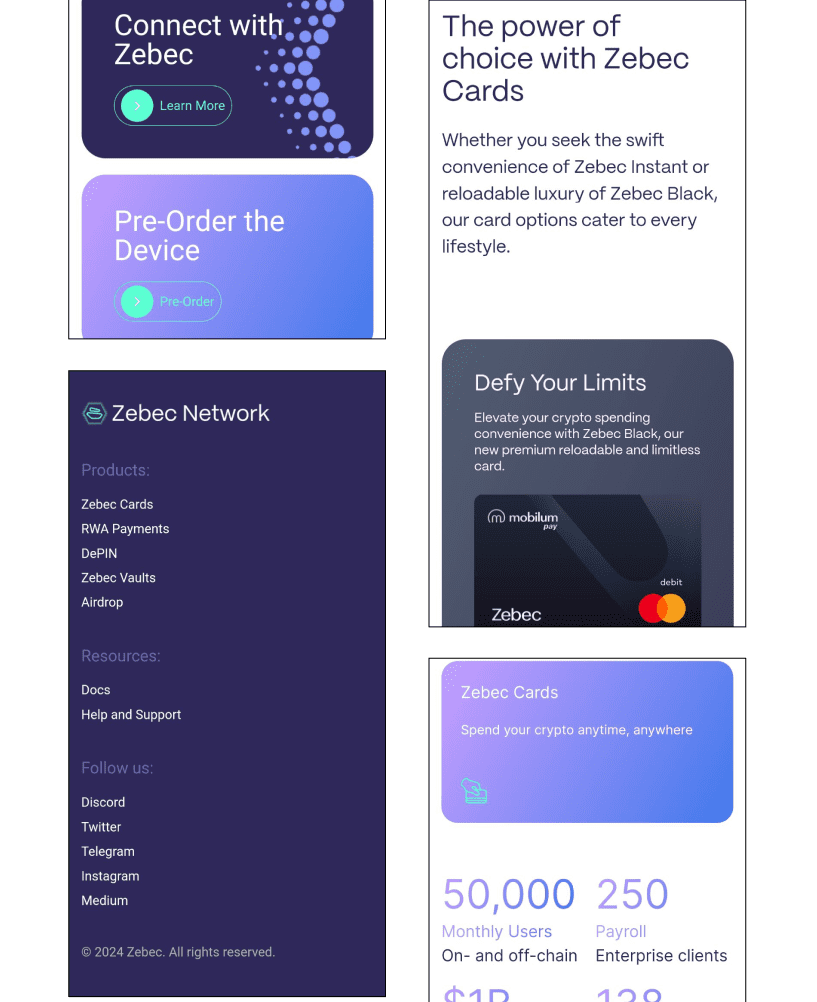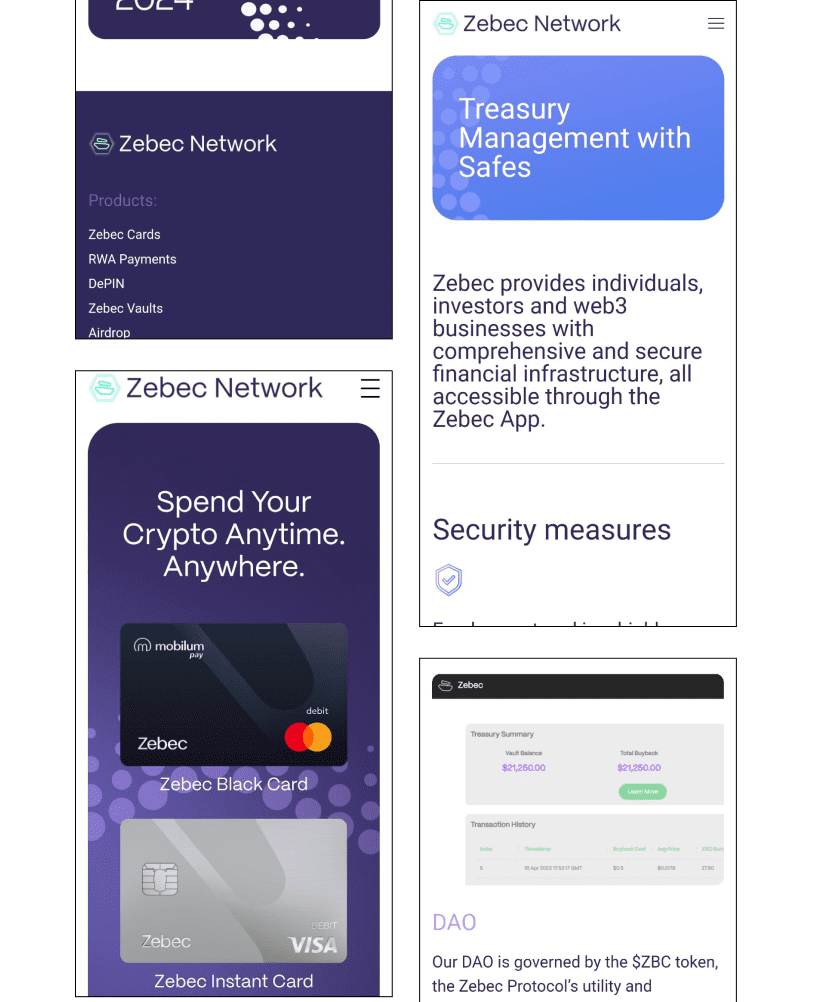
Streamlining Payments with Blockchain
Zebec Network is a cutting-edge fintech platform utilizing blockchain technology to enhance financial management for businesses and individuals. Backed by the expertise typically delivered by a full-scale blockchain development company, Zebec focuses on building production-ready financial infrastructure rather than experimental tools. It offers real-time, continuous payments, making payroll and financial processes more efficient. Users can easily convert cryptocurrencies into fiat currencies and use payment cards for their daily transactions.

Get Started with this product
Zebec enables per-second payroll, offering instant access to earnings, reduced fees, and global currency support, streamlining payroll for modern businesses and enhancing financial control for employees.
Spend crypto as fiat with zero fees using Zebec’s non-custodial card, accepted in 138 countries via Visa and Mastercard, bridging digital assets with traditional finance systems seamlessly.
Zebec’s Nautilus Chain is a modular, scalable blockchain supporting fast RWA payments and DePin integration, enabling secure and high-performance financial applications across global blockchain networks.
Zebec’s DePin infrastructure connects physical assets with digital systems, enabling efficient, secure, and scalable real-world asset management for global business operations across various industries.
WageLink combines Blockchain Technology and payroll, enabling cross-border USDC payments, budgeting tools, early access to pay, and bill payments in a single, user-friendly platform for modern businesses.
Zebec offers real-time digital asset tracking, budgeting, and automated reporting for web3 companies, helping streamline operations and optimize financial strategies across decentralized ecosystems.
Zebec simplifies multi-chain transactions by enabling smooth integration across blockchain networks, supporting DeFi and token swaps without complex cross-chain development hurdles.
Zebec supports 4,400+ nodes, providing stable, secure, and scalable infrastructure to handle diverse financial activities, enabling continuous growth and innovation across the ecosystem.
Zebec Network’s clients primarily sought a solution that could revolutionize their financial operations by leveraging blockchain technology. Traditional payment systems were plagued by delays, high transaction costs, and a lack of transparency, which significantly impacted business efficiency and employee satisfaction. The clients needed a system that could facilitate real-time, continuous payments to streamline payroll processes. This would ensure that employees are paid promptly for the time worked, eliminating the common issues associated with traditional payroll systems, such as delays and discrepancies..
Additionally, clients required a comprehensive financial management tool that could handle both cryptocurrency and fiat transactions seamlessly. They needed a platform that could not only manage payroll but also provide advanced treasury management features, such as cash flow analysis, budgeting, and investment tracking. The solution had to be user-friendly, secure, and compliant with global financial regulations. Clients also emphasized the importance of a flexible system that could adapt to the unique needs of different industries, ensuring smooth integration with their existing financial infrastructure. The overarching requirement was a holistic financial solution that could enhance operational efficiency, reduce costs, and provide a transparent, real-time overview of financial transactions.

Miners solve complex problems to validate transactions. It ensures strong security but consumes high energy and processes transactions slower than other models, making fraud and tampering extremely difficult.
Token holders vote for delegates to validate transactions. It improves speed, scalability, and decentralization, ensuring honest behavior by making delegates accountable to the voters who elect them.
BFT allows consensus despite faulty or malicious nodes. It maintains network integrity by tolerating compromised participants, ensuring secure validation in unreliable or adversarial network conditions.
Enables secure validation of transactions across multiple blockchains. It improves interoperability, allowing seamless asset transfers and data exchange between networks for a more integrated decentralized ecosystem.
Validators stake tokens to confirm transactions. It enhances efficiency, reduces energy use, and promotes fairness, giving more influence to honest participants with higher stakes in the network.
Combines PoW and PoS benefits. PoW ensures security while PoS validates transactions, offering balance, scalability, and efficiency while reducing the downsides of using one mechanism alone.
Uses trusted validators to confirm transactions quickly. Ideal for private blockchains, PoA delivers high speed, low energy use, and security within controlled, permissioned environments.
Divides blockchain into smaller shards processing independently. This improves scalability and speed by enabling multiple transactions simultaneously, addressing performance issues as the network expands.
Visual identity and design elements
Primary font family and usage

Brand colors
#be9dff
#808bf5
Project Approach Zebec’s approach to revolutionizing financial transactions focused on integrating blockchain technology into real-world applications to enhance efficiency and scalability. The project began with the development of a continuous settlement protocol on the Solana blockchain, designed to facilitate real-time, low-cost transactions. This foundational technology was aimed at overcoming inefficiencies in traditional financial systems, such as delays and high fees. Zebec then expanded its technology stack by introducing the Nautilus Chain, a high-performance, modular blockchain optimized for global Real World Asset (RWA) payment flows and decentralized physical infrastructure (DePin). By leveraging its Proof-of-Stake (PoS) and Delegated Proof-of-Stake (DPoS) mechanisms, Zebec ensured a secure and scalable platform that could handle high transaction volumes and maintain network integrity.
Project Results The implementation of Zebec’s solutions has led to significant advancements in financial transaction efficiency and accessibility. The real-time payroll system has been adopted by numerous companies, allowing them to streamline their payroll processes and offer employees unprecedented access to their earnings. This innovation has reduced transaction fees and processing times, addressing common pain points associated with traditional payroll systems. Zebec’s expansion into multiple blockchains, including Base, BNB Smart Chain, NEAR and Ethereum, has further enhanced its ability to support diverse financial activities and applications.
The launch of the Zebec Instant Card has revolutionized cryptocurrency spending, providing users with a fee-free, multi-chain solution for everyday purchases. This card’s availability in 138 countries and its support from global Visa and Mastercard networks have broadened its user base and facilitated seamless cryptocurrency transactions.

Zebec’s rapid growth across multiple blockchains created scalability and integration hurdles. Supporting Real World Asset (RWA) payments and decentralized physical infrastructure (DePin) required a modular, high-performance blockchain framework. Integrating the Nautilus Chain with Base, BNB Chain, NEAR, and Ethereum demanded advanced interoperability strategies. The development team focused on building seamless cross-chain operations to ensure efficiency, security, and scalability, enabling Zebec to operate smoothly within a fast-expanding multi-chain financial ecosystem.
Operating in blockchain’s evolving regulatory landscape posed major challenges for Zebec. As a firm bridging decentralized finance and traditional financial systems, it needed to comply with diverse legal frameworks. This required aligning digital asset transactions with jurisdiction-specific laws, enforcing strict anti-money laundering (AML) standards, and applying know-your-customer (KYC) processes. Zebec’s proactive compliance strategy ensured legitimacy, trustworthiness, and secure adoption of its innovative solutions across regions with complex and rapidly changing financial regulations.
Driving adoption of Zebec’s blockchain-based financial solutions required extensive education and trust-building. Many users were unfamiliar with decentralized finance, making awareness essential for scaling adoption. Zebec highlighted the benefits of its real-time payroll system, multi-chain Zebec Instant Card, and ecosystem products to show clear advantages over traditional finance. By emphasizing transparency, security, and efficiency, Zebec built user confidence while making blockchain-based solutions accessible, practical, and appealing to a global audience.

Zebec Network provides users with advanced blockchain solutions for real-time payments, payroll, and financial management.





